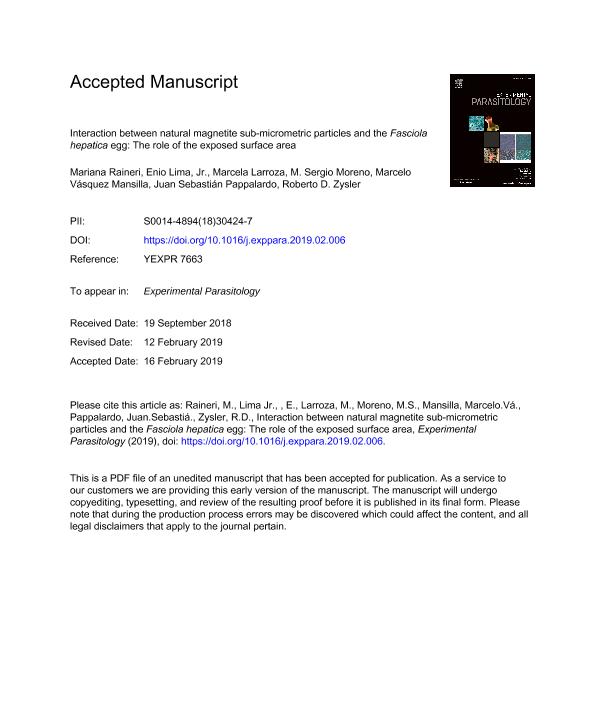Artículo
Interaction between natural magnetite sub-micrometric particles and the Fasciola hepatica egg: The role of the exposed surface area
Raineri Andersen, Mariana ; Lima, Enio Junior
; Lima, Enio Junior ; Larroza, Marcela Patricia; Moreno, Mario Sergio Jesus
; Larroza, Marcela Patricia; Moreno, Mario Sergio Jesus ; Vasquez Mansilla, Marcelo
; Vasquez Mansilla, Marcelo ; Pappalardo, Juan Sebastian
; Pappalardo, Juan Sebastian ; Zysler, Roberto Daniel
; Zysler, Roberto Daniel
 ; Lima, Enio Junior
; Lima, Enio Junior ; Larroza, Marcela Patricia; Moreno, Mario Sergio Jesus
; Larroza, Marcela Patricia; Moreno, Mario Sergio Jesus ; Vasquez Mansilla, Marcelo
; Vasquez Mansilla, Marcelo ; Pappalardo, Juan Sebastian
; Pappalardo, Juan Sebastian ; Zysler, Roberto Daniel
; Zysler, Roberto Daniel
Fecha de publicación:
04/2019
Editorial:
Academic Press Inc Elsevier Science
Revista:
Experimental Parasitology
ISSN:
0014-4894
Idioma:
Inglés
Tipo de recurso:
Artículo publicado
Clasificación temática:
Resumen
Fasciolosis is a zoonotic world widely distributed disease caused by the liver fluke Fasciola hepatica, which affects animals and occasionally humans. On the other hand, natural iron oxide particles like magnetite are commonly found in soils where they participate in a wide range of environmental processes like organic matter decomposition, the adsorption of ions and molecules, and chemical reactions that involve the participation of soil living microorganisms. Since Fasciola eggs become soil components after being released with the infected animal faeces, this study focused on the characterization of the natural interaction between natural sub-micrometric magnetite particles and F. hepatica eggs. Our results indicate that particle binding to the F. hepatica egg depends on the particle size and it is also related to the exposed surface area since any condition that favors particle agglomeration leads to the reduction of the particle-eggshell binding intensity. Interestingly, this binding was avoided when proteins or phosphate were incorporated to the incubation solution, but not after formaldehyde fixation of eggs. Finally, when eggs were exposed to an external magnet after being incubated with magnetite particles, they were attracted to it without particles being detached, indicating a strong type of bonding between them. Therefore, the results presented here give new insights in order to improve the possibility of harvesting F. hepatica eggs by using magnetic materials.
Palabras clave:
FASCIOLA HEPATICA
,
IRON OXIDES
,
MAGNETIC PARTICLES
,
MAGNETITE PARTICLES
Archivos asociados
Licencia
Identificadores
Colecciones
Articulos (UE-INN - NODO BARILOCHE)
Articulos de UNIDAD EJECUTORA INSTITUTO DE NANOCIENCIA Y NANOTECNOLOGIA - NODO BARILOCHE
Articulos de UNIDAD EJECUTORA INSTITUTO DE NANOCIENCIA Y NANOTECNOLOGIA - NODO BARILOCHE
Articulos(CCT - PATAGONIA NORTE)
Articulos de CTRO.CIENTIFICO TECNOL.CONICET - PATAGONIA NORTE
Articulos de CTRO.CIENTIFICO TECNOL.CONICET - PATAGONIA NORTE
Citación
Raineri Andersen, Mariana; Lima, Enio Junior; Larroza, Marcela Patricia; Moreno, Mario Sergio Jesus; Vasquez Mansilla, Marcelo; et al.; Interaction between natural magnetite sub-micrometric particles and the Fasciola hepatica egg: The role of the exposed surface area; Academic Press Inc Elsevier Science; Experimental Parasitology; 199; 4-2019; 59-66
Compartir
Altmétricas



